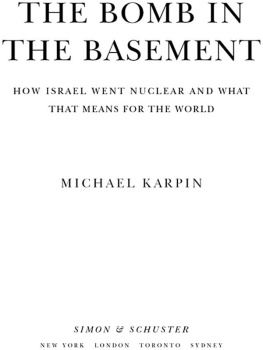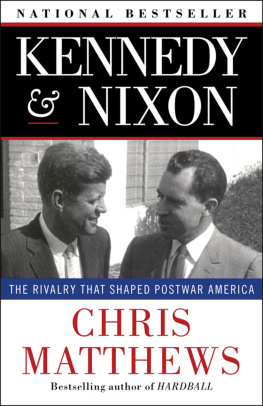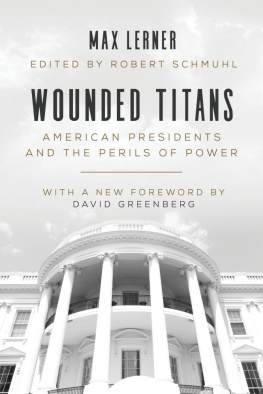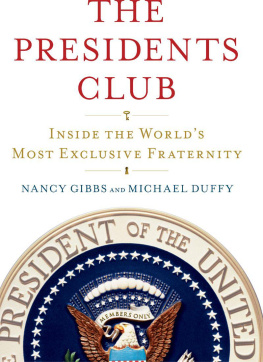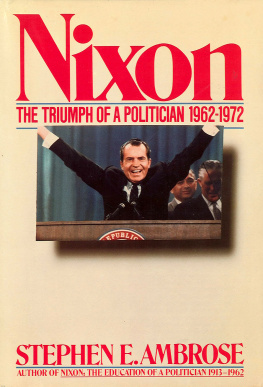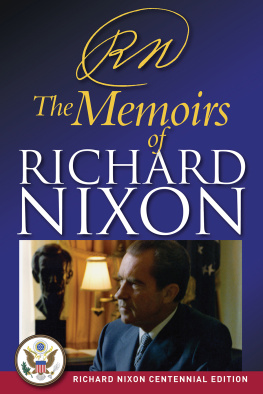THERMONUCLEAR
MONARCHY
CHOOSING BETWEEN
DEMOCRACY AND DOOM
Elaine Scarry

W. W. NORTON & COMPANY
NEW YORK LONDON
When you hear the clams calling
to the moon
To change the tides
Id be interested in that kind of underworld.
Grandin Conover
CONTENTS
THERMONUCLEAR MONARCHY
I magine that there one day came to exist on earthsometime in the futurea solitary country with a new technology. The technology has let this solitary country station a door (or more precisely, a series of doors) under the floor of every other country in the world.
If the leader of the solitary country ever feels imperiled or impeded by another country, he can open the trap door and, in a single day, eliminate the population of that rival country. Because the arrangement of doors beneath each national floor is sectioned, the leader can alternatively choose to eliminate just part of the enemy country, a fourth of it, or a third of it; he might choose to open the doors beneath the floor of the opponents military installations only, thereby eliminating those installations and, say, one-thirtieth of the countrys population.
As a shorthand, this ingenious technology and the policies that enable its use might be called the Flexible Floor Doctrine, for it enables the leader not simply to make rapid decisions about the portion of floor to be dropped beneath the feet of any single enemy population but beneath a whole series of enemies. Reciting a few codes and performing a few stark hand gestures, the leader can open the trap doors beneath one-quarter of the population in one nation, beneath one-half of the population in an adjacent nation, and beneath the entire population of a third allied nation located on the other side of the globe. Remarkably, he can do all this in a single hour of a single day.
It is easy to see that the Flexible Floor Doctrine has hideous disadvantages for all countries on earth other than the one controlling the floor levers. Even if the technology is used only once or twice in each century, it will be kept in a state of steady readiness (the levers, latches, and hinges will be kept fully lubricated; their mechanisms will undergo constant innovation and redesign; indeed, if the technology is not kept in a perfect state of repair, the floor doors might accidentally swing open even without any intentional act). The steady readiness of the polished technology means that the subject populations must stay always on their toes. Given the colossal asymmetry in the power to injure between the solitary leaders with access to the floor levers and the millions of inhabitants standing on those imperiling floors, the inhabitants will find themselves, whenever possible, trying to remain on good terms with those foreign leaders, their political acts, their economic decisions, even their moral descriptions.
Though it is hard to conceive of an international arrangement with greater asymmetry and therefore greater unfairness, the advanced country might come to think of itself as fair, even as the fairest of nations, for it each day has the power to annihilate millions of people and each day (or almost each day) abstains from doing so. (Other countries, in its view, seem to hit each other with sticks and stones every chance they get.) The inhabitants of earth will find it in their interest to agree with the lever countrys description of its own generosity: they cannot influence whether the flexible floor is absent or present but only whether it stays closed or suddenly drops open beneath them, and they can diminish the chance of its dropping open beneath them by smiling, waving, and, in general, being cooperative and quiet. Those people who see the flexible floor as a moral outrage will have a hard time finding an effective way to protest it. Their complaints will go unheard; or if heard, will sound like unharmonious eruptions motivated by small-minded envy of the lever countrys power, freedom, and fairness.
It might at first seem that, just as the Flexible Floor Doctrine confers overwhelming disadvantages on all the populations who reside on the flexible floor, so it confers profound advantages on the population who resides on sturdy ground and whose scientists, engineers, and leaders have put the flexible floor plan into place beneath other peoples feet. While those other nervous populations must remain always aware of the flexible floor (sometimes acutely, sometimes peripherally), the people in the lever country need not think about it much at all. Sometimes they will be genuinely startled when they suddenly remember that there is such a thing! They have no power over whether their leader pulls the lever, nor any information about whether he contemplates doing so; so it is pointless to think about it, and pleasurable to have ones mind free for other matters.
But despite such apparent advantages, the population in the lever country is itself in mighty peril. The first peril is the possibility that once this technology is invented, another country (or two other countries, or three other countries) will obtain it and install a framework of doors under the original countrys formerly secure floors. Second, because the central feature of the technology is that it allows One Person (the leader) to single-handedly retract life from beneath the feet of millions of people, some other One Person (a terrorist, a teenager, a criminal, a floor hacker) may gain access to the levers and so annihilate millions of people. Third, the original lever country can enter into economic competition with its opponent to deprive the opponent of the wherewithal to maintain the expensive flexible floor technology; but now that rusting technology of the former rival will be almost as dangerous as when used by the solitary state leader or stateless terrorist.
Even if the country that invented the original flexible floor technology remains the sole possessor of it (closely monitoring the rest of the world, interrupting any attempts to duplicate the technology, threatening annihilation if the offending country does not desist), a fourth and fifth peril remain. The fourth peril comes from what was originally set forth as an advantage. The inhabitants of the lever country need not be mindful of the flexible floor technology since they are not on the receiving end of the injury, are not themselves the ones controlling the levers, do not have visual access to the subterranean apparatus, do not have access to information about its contemplated use by their leader, do not hear the complaints of foreign populations, or hear those complaints only as alarmist envy. Ignorant of the profound moral harm that has been set in placean arrangement for the annihilation of tens of millions of people against which there can be no act of self-defensehow can the inhabitants of the lever country discover the way to undo or redress it?
The fifth peril re-enacts and compounds the fourth, magnifying the passivity of the home population, ensuring that they cannot take action against the unprecedented moral harm in which they are themselves steeped. The essential feature of the flexible floor technologyit locates in the hands of a solitary person the power to kill millions of personscarries with it a momentous shift in the nature of government, for it means that the home populations power of, and responsibility for, self-defense, has been lifted away from them and condensed into the head of government. Just as the flexible floor technology strips all foreign populations of the capacity for self-defense, so it has stripped the home population of the capacity for self-defense. Given the difference in the level of physical injury to which each is subject, one might justly worry that this must be a play on words. But we will eventually see the deep continuity in the two outcomes. For the moment, it is enough to note that the home country has unknowingly reverted to an archaic form of government. It has become what centuries earlier had been called a monarchy, though monarchies of the past were comparatively harmless because the executive had only the ceremonial pretense of omnipotence (crowns, gowns, and odd forms of bowing) rather than the literal technology for killing entire populations at will.
Next page


